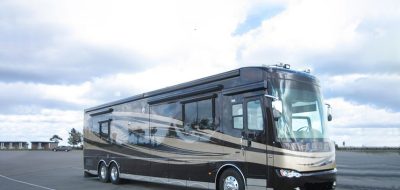Is a GPS nav. system a worthwhile option? To answer this question, I think we need to look at what possible benefits it may provide.
First of all, basic point “A” to point “B” geographical guidance. This is the primary use for most passenger automobiles, but what about the uses in a recreational vehicle application? Here, they are somewhat broader and appear to derive more benefits from the features they offer.
Now we have to remember that most GPS navigation systems are configured to normal automobile travel, not recreational vehicles that may have height clearance issues. So, in large Class C’s, tall 5th wheel trailers, and with Class A motor homes, these may be less than ideal. There are, however, user configurable units available today. One of these programmable systems is the Rand McNally GPS. It can be user configured to exactly the specifications of your RV type and size. This feature is not only extremely convenient, but also offers a greater margin of safety.
There are also two types of mount; in-dash permanent or stand-alone portable. The built in units offer an in-dash monitor that does not require any recharging as it is always connected to power. The portable needs to be plugged into a 12 volt outlet or recharged regularly if used in a full portable mode. The portable, however, offers something the built in cannot. That is, the ability to use in other vehicles. Unlike your family car, you are far more apt to use an additional vehicle when traveling in an RV. Your stand-alone, portable GPS navigation will serve you in both.
Let’s look at the GPS applications that the typical RV traveler might use:
- Normal point to point navigation
- Locating and navigating to various points of interests (Tourist Attractions)
- Locating and navigating to needed services (Groceries, repairs, fuel, etc.)
- Travel route planning
- Geo-marking favorite camping spots
- Speed limit alerts
- Sharp turns and steep grade warnings
- Avoiding low bridges, weight restricted routes, etc.
An additional benefit, albeit one we never hope to need, is pin-point locating in a medical emergency. GPS units can provide long/lat coordinates that can be communicated allowing an air ambulance to find you quickly and accurately. So, I think we can conclude from this that the GPS navigation option, be it built-in or portable, is a viable choice. It offers real time help in finding everything you need or want. It also adds another layer of safety for you and your rig. Be safe and enjoy.








David Mehrhoff
She talks too much……but I guess that's OK
Tom Ryan
The ability to configure your own route, and have the navigation warnings pertaining to height, weight, and hazmat restrictions as they pertain to that route is invaluable.
Jerry Dykstra
Recently started using the Rand McNally/Good Sam GPS. Incredible tool loaded with info and help. Large screen, easy to read. Great!
Newby Fun Resorts
Although most Smartphones include GPS and apps to help you navigate in a RV, we believe an RV specific GPS would be the most helpful. These can help tell you which roads will be safest for RV travel, and so much more. But in a pinch, never underestimate the power of a Smartphone.
Newby Fun Resorts
Although most Smartphones include GPS and apps to help you navigate in a RV, we believe an RV specific GPS would be the most helpful. These can help tell you which roads will be safest for RV travel, and so much more. But in a pinch, never underestimate the power of a Smartphone.